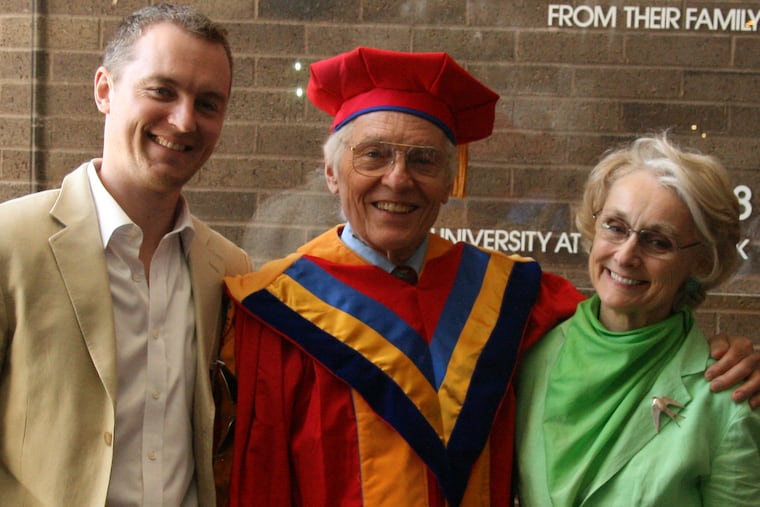Charles F. Wurster, environmental pioneer and science professor emeritus, has died at 92
“It was like dropping a pebble into a pond,” he said of his early environmental activism. “You get a little wave and then another, and they make circles, and they spread over the whole pond.”

Charles F. Wurster, 92, of Silver Spring, Md., formerly of Philadelphia, cofounder of the Environmental Defense Fund and professor emeritus of environmental science at Stony Brook University in New York, died Thursday, July 6, of chronic obstructive pulmonary disease at his home.
A pioneer in environmental studies and activism, Dr. Wurster and other scientists, lawyers, economists, and volunteers founded the Environmental Defense Fund in 1967. Their strategy was to confront environmental dangers in courts around the country and provide industrial polluters with economic incentives to change.
Those efforts resulted in, among other things, the United States banning the pesticide DDT in 1972, removing lead from paint and gasoline in the 1980s, and cutting sulfur dioxide emissions in half as part of the 1990 Clean Air Act.
In a 2015 interview posted on the EDF website, Dr. Wurster said climate change was the world’s next big challenge. “It is a grueling marathon race,” he said. “But EDF and the world can win if we all stay committed to fight it with everything we’ve got. “
After earning a bachelor’s degree in chemistry at Haverford College, a master’s degree in organic chemistry at the University of Delaware, and a doctorate in organic chemistry at Stanford University in 1957, Dr. Wurster eventually accepted a job as assistant professor of biological sciences at Stony Brook’s Marine Sciences Research Center in 1965.
He retired in 1995 as associate professor of environmental toxicology and received an honorary doctorate of science from Stony Brook in 2009. In his acceptance speech, he said: “The power of an idea is brought to fruition by the power of persistence.”
Dr. Wurster was indeed tenacious. He served on the EDF’s board of trustees for more than five decades and helped it grow to more than three million members in 28 countries.
“I’ve never met a man more doggedly persistent than Charlie,” Fred Krupp, president of the EDF, said in a tribute. “Without his legendary perseverance, the ban on DDT might not have been won and [the] Environmental Defense Fund might not have been born.”
Dr. Wurster published DDT Wars, a firsthand account of the EDF’s early days, in 2015, and told Cat Lazaroff in an online interview that is posted on the Haverford website: “We were up against the biggest, most powerful opponents you can find. And we beat them. … When you get thrown out of court, you don’t go away. You go back and knock again. You keep banging on the system.”
Dr. Wurster also helped establish the Environmental Defence Society in New Zealand, and he sat on international panels, committees, and commissions, including the U.S. Environmental Protection Agency’s Pesticides Policy Advisory Committee in the late 1970s.
“I am under no illusions that it will be easy. It is the toughest battle EDF has ever confronted.”
He was on the board of directors at Defenders of Wildlife and traveled to Australia, Norway, South Korea, and elsewhere as a visiting professor and scientist. He received a 1991 Excellence Award from the State University of New York United University Professions, a 1977 Community Service Citation from Long Island University, and a 1972 alumni award from Haverford.
“He was always interested in the natural world and talked often of its tremendous value and beauty,” said his son Erik.
Charles Frederick Wurster Jr. was born Aug. 1, 1930, in Philadelphia. He grew up in the Olney neighborhood and graduated from Germantown Friends School. A nonsmoker, he lived with asthma for much of his life.
He was a star pitcher on the baseball teams at Germantown Friends and Haverford, and spent one summer when he was young working in a gold mine in Alaska. He spent a few years as a chemist at Monsanto Research Corp. after college and first noticed the effects of DDT on birds while working as a biological science research associate at Dartmouth College in the early 1960s.
He married Doris Hadley, and they had son Steven. After a divorce, he married Eva Tank-Nielsen, and they had daughter Nina and son Erik. They divorced later. His first former wife died earlier. He and longtime partner Marie Gladwish were together for many years.
A lifelong birder, Dr. Wurster led ornithology and ecology tours to Africa, South America, the Arctic, Antarctica, and elsewhere around the world. He could identify dozens of songbirds and appeared in the 1986 TV documentary Return of the Osprey.
He liked to garden, make family dinners, and fix things around the house. “He was an attentive father,” said his son Erik.
Dr. Wurster returned often to class reunions at Germantown Friends and Haverford, and gave this advice to listeners at Stony Brook in 2009: “Seek work that you love. Don’t settle only for dollars, mansions, or yachts so that you thank God it’s Friday. Make the world a better place. You will also be better, and it’s much more fun.”
In addition to his children, partner, and former wife, Dr. Wurster is survived by four grandchildren and other relatives.
Donations in his name may be made to the Environmental Defense Fund, 1875 Connecticut Ave. NW, Suite 600, Washington, D.C. 20009.